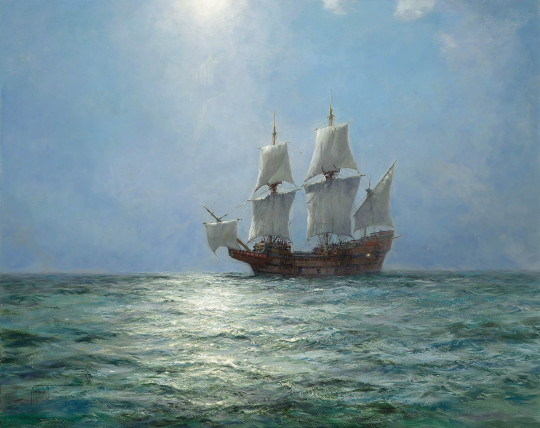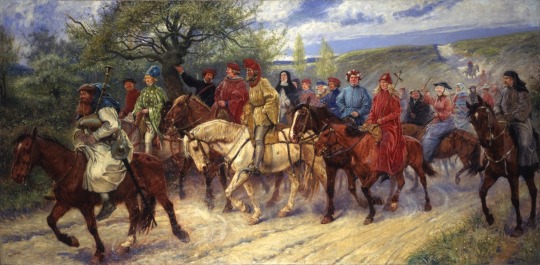#pilgrims
Explore tagged Tumblr posts
Text

The Mayflower passengers who arrived in Plymouth November 11, 1620 vs. The Mayflower passengers who survived to Thanksgiving 1621, less than one year later.
115 notes
·
View notes
Text

Boat people, go home!
If you have to spend Thanksgiving with some MAGA relative, bring your laptop and make that cartoon the temporary screen picture. 🤭
#indigenous peoples#native americans#first nations#pilgrims#boat people#illegal immigrants#migrants#mass deportations#maga#donald trump#america first#thanksgiving#rob rogers
87 notes
·
View notes
Text

Isolation: The Mayflower becalmed on a moonlit night by Montague Dawson
#montague dawson#art#mayflower#new world#sea#moonlit#night#pilgrims#america#north america#england#britain#american#english#british#europe#european#history#age of discovery#age of exploration#age of sail#ocean#moonlight#moon#ship#ships#marine art#maritime art
98 notes
·
View notes
Text

Heinz Oven Baked Beans (1937)
#vintage thanksgiving ads#heinz oven baked beans#1930s advertising#pilgrims#bostonians#canned food#1930s#1937
51 notes
·
View notes
Text

Give Thanks that *our* Sun has always been Golden and bedecked with Spikes! Good Morning! Unleash your Gratitude upon the world today!!!
#morning#good morning#good morning message#good morning image#good morning man#the good morning man#the entire morning#gif#gm#tgmm#☀️🧙🏼♂️✌🏼#thanksgiving#happy thanksgiving#turkey day#i know what color the sun is#the yellow crayola#yellow crayola#yellow crayon#yellow with spikes#yellow sun#morning vibes#yellow sun with spikes#pilgrim#pilgrims#party#lfg#cool party
44 notes
·
View notes
Text

The Pilgrims Came
The Pilgrims came across the sea, And never thought of you and me; And yet it's very strange the way We think of them Thanksgiving Day.
We tell their story old and true Of how they sailed across the blue, And found a new land to be free And built their homes quite near the sea.
Every child knows well the tale Of how they bravely turned the sail, And journeyed many a day and night, To worship God as they thought right.
The people think that they were sad, And grave; I'm sure that they were glad— They made Thanksgiving Day—that's fun— We thank the Pilgrims, every one! by Annette Wynne
37 notes
·
View notes
Text



i love trench crusade
#trench crusade#trenches#trench pilgrims#new antioch#antioch#pilgrims#heretic#heretic legion#warhammer#warhammer 40000#wwi#ww1#alt history
36 notes
·
View notes
Text

Thanksgiving Is Loading
41 notes
·
View notes
Text

23 notes
·
View notes
Text










Milestone Monday
On this day, September 16 in 1620, English Pilgrims set sail for the English settlement in Virginia from Plymouth, England in the Mayflower. Because of the strong winter seas, however, they never made it that far, and instead made landing at a spot they named after their departure point, Plymouth, in late December -- not the best time to set up shop in New England. They were ill-prepared to fend for themselves, and if it wasn't for the assistance of the indigenous people of the area, the colonists never would have survived.
We commemorate this milestone with a children's book from our Historical Curriculum Collection, We Were There with the Mayflower Pilgrims by Robert N. Webb, illustrations by Charles J. Andres (1913-2008), and historical consultation by George F. Willison (1896-1972), published in New York by Grosset & Dunlap in 1956. While there are many historical accuracies in this book, its rhetoric reflects the Euro-American centrism and ideas of American exceptionalism normalized during the period: "America was a wilderness, filled with savage Indians"; "[The Mayflower Compact was] the first of many important and historical documents which were to guide America to its greatness." And as one might imagine, the relationship between the English settlers and the indigenous population is predictably whitewashed.
View more posts on works from our Historical Curriculum Collection.
View more Milestone Monday posts.
#Milestone Monday#milestones#Pilgrims#Mayflower#Plymouth#Historical Curriculum Collection#We Were There with the Mayflower Pilgrims#Robert N. Webb#George F. Willison#Charles J. Andres#Grosset & Dunlap
36 notes
·
View notes
Text

The Canterbury Pilgrims by Paul Hardy
#the canterbury tales#art#illustration#paul hardy#canterbury#pilgrims#england#medieval#middle ages#english#geoffrey chaucer#chaucer#history#canterbury tales#tales of caunterbury#st thomas becket#saint thomas becket#kingdom of england
428 notes
·
View notes
Text

Muslim pilgrims in Constantinople, modern-day Istanbul, Turkey
Ottoman vintage postcard
#postcard#ansichtskarte#briefkaart#photography#carte postale#vintage#postkarte#photo#historic#postkaart#ephemera#istanbul#ottoman#sepia#turkey#modern#constantinople#pilgrims#muslim#tarjeta#postal
13 notes
·
View notes
Text

camino frances
© 2023 Yiannis Krikis
#camino frances#lensblr#lensculture#fine art photography#photographers on tumblr#landscape#pilgrims#spain
142 notes
·
View notes
Text

… thinking of white granulated sugar was something the pilgrims never had.
Parents Magazine - 1953
#1953#sugar#pilgrims#thanksgiving#vintage ads#vintage ad#advertising#advertisement#1950s#1950s ad#1950's#1950's ad#funny#humor#humour
14 notes
·
View notes
Text

Pumpkin pie for Thanksgiving Day, anyone?
#vintage illustration#thanksgiving#thanksgiving day#thanksgiving day meals#thanksgiving day recipes#turkey day#day of the turkey#food#pilgrims#the holidays#the holiday season#thanksgiving day dishes#turkey#pies#side dishes
16 notes
·
View notes